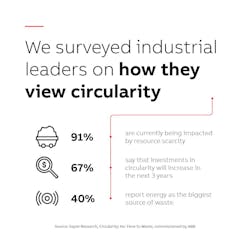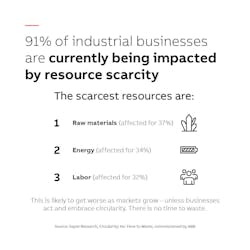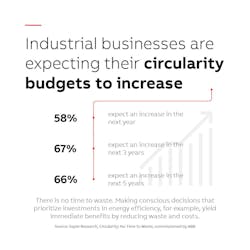ABB Survey: Circular Economy Needed ASAP
By TARAK MEHTA, President, ABB Motion
The World Economic Forum (WEF) has made it abundantly clear that our current way of life depletes 60% more resources than the Earth can sustainably provide.
The urgent need to transition to a circular economy, aimed at minimizing waste and maximizing resource utilization, is widely recognized as essential for safeguarding our environment. This shift becomes even more pressing as our finite resources dwindle rapidly, and our current practices contribute to escalating pollution and climate change.
Embracing circularity not only improves resource efficiency and saves money but also enhances business resilience in the face of global challenges. To gain insights into key trends, perceptions, and attitudes towards circularity, ABB Motion conducted a survey in October 2023, involving 3,304 senior industrial decision-makers from diverse sectors and countries. The survey highlights three main takeaways for businesses striving to maintain their competitiveness:
- Adopt a holistic approach that considers all aspects of circularity;
- Instill a sense of responsibility for circularity at every level of the organization;
- Embrace new technologies and foster collaborations with other groups to expedite the advancement of circular practices.
The findings demonstrate that businesses now view circularity through a comprehensive lens that surpasses conventional recycling practices. This broader perspective encompasses waste reduction, sustainable design, and the development of resource-efficient processes. However, much work remains to establish a common understanding and metrics for circularity across industries.
- Read the full results of the survey here.
Among the surveyed countries, Chinese respondents displayed the highest agreement regarding the benefits of circularity, aligning with their national circular policy. In contrast, European respondents exhibited lower agreement levels, despite having arguably the most comprehensive circular policies.
Moreover, businesses that have implemented circularity practices throughout their entire organization, from C-level executives to frontline operators, reported significant benefits. These include improved cost control, waste reduction, enhanced business reputation, and energy savings – ever more important as 40% reported energy as the biggest source of waste.
The findings underscore the critical significance of consistently and comprehensively implementing circularity practices within companies. In the short-term, these practices enable the optimization of energy efficiency and resource utilization, while in the long-term, industrial leaders highlight additional strategic advantages, such as enhanced process efficiency, improved cost control, and positive customer perception. The biggest increase to budgets for circularity-related initiatives is expected over the next three to five years.
Despite their optimism about future investments in circularity, most businesses presently face challenges related to resource scarcity and waste. Approximately 95% of businesses are encountering barriers to adopting circular practices, including cost management and limited resource access.
To accelerate the adoption of circularity, businesses are actively seeking technologies, partnerships, and other forms of support. These initiatives include implementing energy-efficient motors and drives, collaborating with waste management and recycling companies, incorporating more recycled materials into their processes, and conducting lifecycle assessments for equipment.
While new regulations will compel businesses to embrace circular practices, 77% feel the need for increased government support. To stay ahead of the curve, businesses must embrace circularity to benefit their operations and the environment.
There is no time to waste.



